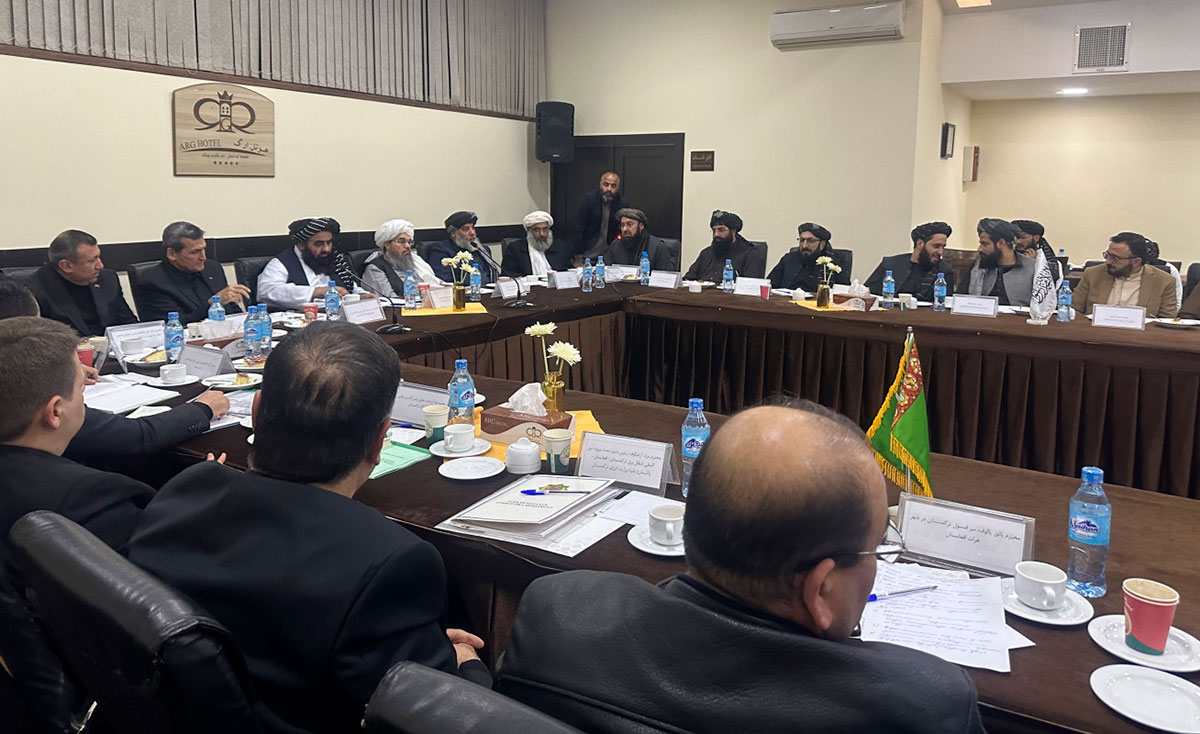Turkmenistan and Afghanistan discussed development of bilateral cooperation in several sectors as senior ministers of the two countries met last week.
Turkmen Foreign Minister Rashit Meredow met Taliban's acting Foreign Minister Mawlawi Amir Khan Muttaqi, acting Minister of Mines and Petroleum Sheikh Shahabuddin Delawar and Trade Minister Nooruddin Azizi, according to the state-owned Turkmendowlethabarlary (TDH) news agency.
The Turkmen delegation, led by the foreign minister, was on a working visit to Herat Province of Afghanistan on December 16-17.
"In particular, the sides discussed the current state of implementation of the projects of the Turkmenistan-Afghanistan-Pakistan-India (TAPI) gas pipeline, the Turkmenistan-Afghanistan-Pakistan (TAP) high-voltage power transmission line, and the expansion of Afghanistan's railway infrastructure," the report said.
The delegations visited energy and transport facilities that are being constructed by Turkmen and Afghan companies.
Muttaqi met Meredow at Afghanistan's Torghondi border crossing in the country's western province of Herat.
Hafiz Zia Ahmad, Foreign Ministry Spokesman, said in a post on X (formerly Twitter) on December 16 that the two foreign ministers and the delegations accompanying them had also visited the railway station at the border crossing.
"The purpose of the visit of the Afghan-Turkmen senior delegations to Herat was to assess progress in the implementation of joint projects between the two countries in the fields of economy, transit, railway, power and energy," Ahmad wrote.
In a separate post on December 17, Ahmad said that the two foreign ministers visited a segment of the TAPI pipeline project in Afghanistan.
According to the statement, a one-day meeting of Taliban and Turkmen representatives from mining, power supply, transport, and railway departments would discuss the resumption of construction of the TAPI pipeline project in Afghanistan, the expansion of the railway station at Torghondi border crossing, trade and transit, and Turkmenistan's power supply to Afghanistan.
Afghanistan's four provinces – Herat, Badghis, Faryab and Jowzjan – share borders with Turkmenistan. There are two ports of entry between Afghanistan and Turkmenistan, one in Herat and another in Faryab. Turkmenistan supplies a significant part of Herat's electricity needs.
Former Afghan President Ashraf Ghani launched the Lapis Lazuli trade corridor in December 2019. The corridor begins from Afghanistan's Torghondi border port in Herat and Aqina port in northern Faryab province. It connects the landlocked country to Europe via road, rail and maritime routes passing through Turkmenistan, Azerbaijan, Georgia and Türkiye. The marine part covers the Caspian and Black seas.
A delegation from the Afghanistan Railway Authority (ARA), led by ARA Director Bakht ur-Rahman Sharafat, and Turkmenistan's railway authorities held discussions in Ashgabat city on December 2. They discussed bilateral cooperation in railways, increasing goods transportation through railroads, and the need for better services at the Aqina and Torghondi border crossings between the two countries.
In late September, the Afghan Taliban de facto government announced that it will build a new port of entry for transit at the borders with Turkmenistan. The government has already sanctioned funds to build a transit port in Bala Morghab district of western Badghis province.
Turkmenistan is also a partner in the TAPI regional project and an exporter of fuel to Afghanistan. The TAPI pipeline, once complete, aims to connect Turkmenistan, Pakistan, and India via Afghanistan. The project, spanning 1,830 kilometers, is expected to deliver 33 billion cubic meters of natural gas annually from Galkynysh, the world’s second-largest gas field, and terminate in the Indian city of Fazilka near the Pakistan border.
The Afghan segment of the pipeline will stretch from the northwest border with Turkmenistan southward through Herat and to Kandahar near the Pakistan border. The Taliban administration has pledged its support for the project, considering it a vital component of the nation’s future economic infrastructure, despite its initiation in Afghanistan in 2018 when the Taliban was fighting the Western-backed government in Kabul.
Afghanistan, which consistently struggles with energy shortages, is expected to consume 5 percent of the gas. The remainder will be split equally between Pakistan and India. Furthermore, Kabul could generate hundreds of millions of dollars in transit fees through this arrangement.







 President Ilham Aliyev shed light on the evolving contours of the peace process with Armenia during an international conference in Baku this week. ...
President Ilham Aliyev shed light on the evolving contours of the peace process with Armenia during an international conference in Baku this week. ...
 Azerbaijan and Armenia started the process of demarcation of their border on Tuesday, with the installation of the first border markers based on ge...
Azerbaijan and Armenia started the process of demarcation of their border on Tuesday, with the installation of the first border markers based on ge...
 Armenian sappers commenced on Monday mine-clearance operations in the territories adjacent to the Saint Mary Church in village of Voskepar (Armenia...
Armenian sappers commenced on Monday mine-clearance operations in the territories adjacent to the Saint Mary Church in village of Voskepar (Armenia...
 Iran and Pakistan have signed eight cooperation documents in various fields, and agreed to strengthen ties to fight terrorism in the region.
Iran and Pakistan have signed eight cooperation documents in various fields, and agreed to strengthen ties to fight terrorism in the region.
 As the conflict between Ukraine and Russia escalates, the strategic importance of Kharkiv, Ukraine's second-largest city, has come sharply into focus.
As the conflict between Ukraine and Russia escalates, the strategic importance of Kharkiv, Ukraine's second-largest city, has come sharply into focus.
 President Aliyev emphasized the critical role of the North-South Transport Corridor in fostering transport cooperation between Azerbaijan and Russi...
President Aliyev emphasized the critical role of the North-South Transport Corridor in fostering transport cooperation between Azerbaijan and Russi...



